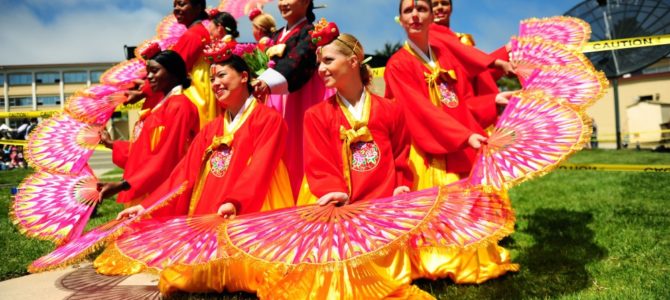
California’s Democrat-controlled state legislature may pass Assembly Bill 101 into law this week. If signed by Gov. Gavin Newsom, it will mandate “ethnic studies” as a high school graduation requirement for all California public schools.
“Ethnic studies” is a series of courses that focus on history, but through perspectives advocates see as “marginalized,” including black, Asian American, and Latin American/Chicano studies. California’s adoption of the proposal could set a precedent for the rest of the country.
We now have precise evidence about who has been developing the ethnic studies curricula that could soon be taught to California’s more than 6 million public school children—and they are Marxist revolutionaries.
Union del Barrio is a revolutionary socialist group that has “dedicated [themselves] to struggle on behalf of ‘la Raza.’” They define “la Raza” as the indigenous and Latino inhabitants of North and South America who must unite as “Nuestra América” to defeat colonialism, capitalism, and neoliberalism. They are fundamentally opposed to the “international capitalist elite that is currently led by United States imperialism.”
Their goals are explicit and extreme: “Revolutionary Nationalism demands a complete transformation of the social, economic, and political institutions that presently form the basis of our oppression,” they argue. Their political philosophy for ethnic studies calls for the complete abolition of borders, government by a race-based socialist collective, and the destruction of Western liberalism.
Using Race to Divide and Conquer
Throughout the past decade, Union del Barrio has been a leading force in crafting the ethnic studies curriculum that may soon be used as a requirement for graduation for all California public school students. It has supported some of the major players responsible for promoting ethnic studies.
These include Jose Lara, one of the lead writers of the original 2018 California Ethnic Studies Model Curriculum (ESMC). The curriculum Lara was involved in drafting, many parts of which future revisions have retained, stated as a purpose to address “US culture and history from the perspective of marginalized groups,” especially “Native People/s and Black, Indigenous, and People of Color.”
It also promoted a “critical consciousness” based on a critical race theory pedagogy advanced by Union del Barrio. One of its sample lessons promotes Black Lives Matter and asks students to address “how African Americans have historically been disproportionately impacted by racial profiling and police brutality in the US.”
Also on the Ethnic Studies Model Curriculum committee is Tolteka Cuauhtin, a former teacher affiliated with the Union del Barrio-founded Association of Raza Educators. Cuauhtin is arguably the most radical of the whole bunch at Union del Barrio. He was the subject of journalist Christopher Rufo’s work earlier this year exposing the ethnic studies curriculum recommending public-school students make chants to Aztec gods of human sacrifice.
More activists on the Ethnic Studies Model Curriculum activity include socialist activist Jeanelle Hope, critical theory propagators Artnelson Concordia and Guillermo Gomez, and Lupe Cardona, “a proud member of the socialist political organization, Union del Barrio.”
Who Let the Radicals In?
How did Lara, Cuauhtin, and Union del Barrio, a Marxist revolutionary group, gain all this power over crafting a curriculum that could affect millions? One of the critical links for ethnic studies activists to get into the California Department of Education (CDE) was Stephanie Gregson. Previously the director of curriculum in Davis School District, she was hired by the CDE as director of curriculum frameworks in 2017. In this role, she was also responsible for overseeing the work of the ethnic studies curriculum advisory committee.
Gregson has a long history with ethnic studies. She shared in a public CDE hearing on October 15, 2019, that “I too felt that Ethnic Studies saved my life. I studied Latino studies as an undergrad and I went through that transformative experience.” As a result, her bureaucratic selections were heavily skewed towards ethnic studies activists (not impartial academics), many of whom were members of Union del Barrio.
Gregson was the one who nominated Lara to the California Instruction Quality Commission which created the model ethnic curriculum for the state. Lara then proceeded to recommend 13 of the 18 individuals on the model curriculum committee that made the final cut. All of them were either directly linked to Union del Barrio, or had sympathies with the movement.
Earlier Controversies Result in Takeover
The original model ethnic studies curriculum, released in 2018, raised significant controversy for blatant antisemitism. The original curriculum included support for the boycott, divest, sanctions movement, a Palestinian activist push that has ties to Hamas. It also included an antisemitic song teaching children that Jews control the world media.
After being released for public comment, the original curriculum received more than 19,000 negative comments. Gregson defended it, saying, “This project is very near and dear to my heart.”
Nevertheless, Union del Barrio’s most radical members were thrown out of the curriculum committee, including Lara and Cuauhtin. They and others then created an activist group called “Save CA Ethnic Studies” and began campaigning to preserve the original ESMC.
Instead of working directly with the state, they began working to convince individual school districts to accept their original curriculum. Without revealing to them the public outcry or the state’s ongoing efforts to revise the curriculum, Cuauhtin and his colleagues convinced dozens of activist organizations and almost every California state university campus to affirm support for their original radical curriculum.
Now, Cuauhtin, Jose Lara, and the Marxist activists of Union del Barrio may have the last laugh, as a provision within the new AB 101 allows local districts to circumvent the state-mandated model curriculum and turn to Union del Barrio for guidance on local ethnic studies curricula.
Teaching California Kids to Believe Communism
Even if districts take the current Ethnic Studies Model curriculum from the California Department of Education, they will be taking a curriculum that borrows heavily from Union del Barrio’s ideology. The new model curriculum, for example, includes a sample lesson instructing students to “recognize that colonization is an ongoing process, and to inspire critically conscious action and reflection.” Members and affiliates of Union del Barrio controlled much of the process of creating the model curriculum, which will be the primary reference for school districts if they are mandated to create their own ethnic studies courses.
Parents overwhelmingly oppose the radical ideas advanced by these organizations, but many are unaware of the depth of this insidious effort. Some parent groups have explicitly expressed opposition to AB 101, but there is not currently sufficient public pressure to shutter the ideas of Union del Barrio working within the CDE.
If AB 101 passes, the ethnic studies industry dominated by Union del Barrio and other activist groups is expected to get much larger. Newsom has already allocated $50 million for the “growth and expansion” of ethnic studies statement in the 2021-2022 budget.
That number is only going to get much bigger, as consultancies led by Cuauhtin charge roughly $1,500 an hour to help implement their ethnic studies programs. The overall projected cost of the ethnic studies mandate to California taxpayers will be $276 million a year, according to the California appropriations committee.
California’s ethnic studies programs have been influenced by Marxist revolutionaries, and Americans must stop them from gaining a multimillion-dollar foothold in school curriculum. The political program of Union del Barrio is very clear: the revolution is not just coming for California. It’s coming for the United States, the Americas, and liberalism as a whole.









